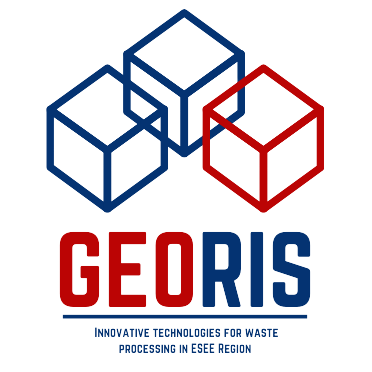GEORIS will apply a novel geopolymerization technology to produce environmentally sustainable construction materials and catalytic powder from industrial waste. Target customers are public authorities responsible for infrastructure development, construction companies, and industrial waste providers. The project is co-funded by the EIT RawMaterials.
Objectives
GEORIS aims to:
- Transfer and apply to selected East and South East European countries a novel geopolymerization technology to Greece, Slovenia, and Poland, to showcase its competitive advantages in applications of urban infrastructure and buildings. This will improve waste management and limit landfilling by 20 tons during the project and up to 800 tons per year by 2030.
- Accelerate the commercialisation potential of the geopolymerization technology to the automotive sector, paving the ground for further business development in Romania, Bulgaria, Poland, and Cyprus, engaging beneficiaries from across the value-chain (public authorities responsible for infrastructure, waste providers, construction companies, business enablers) that will facilitate the transition to full-scale commercial production of the GEORIS catalytic powder.
Solution

The GEORIS geopolymerization technology consists of a modular 40ft unit, which can be transported on-site to produce high added-value materials by recycling general aluminosilicate wastes, such as bauxite residue, copper slag, steel slag, fly ash, cyclones from perlite production, and mine tailings.

- ~30% less CO2 emissions compared to similar production processes.
- 20t of waste diverted from landfills, with the potential of additional 800 tons p.a. by 2030.
- ~25% reduced production costs compared to conventional cement-based pavement blocks and by almost 50% compared to similar-quality fire-resistant panels.
- 50-60% material savings in automotive industry, as the GEORIS catalytic powder serves as a partial substitute for Platinum Group Metals (PGMs) used in catalytic converters.
Activities
- Showcasing the GEORIS technological offering, by initiating small-scale production of construction materials (pavement and fire-resistant panels) near industrial waste sources in GR and SI, which will be subsequently used in actual construction works in GR, SI and RS.
- Identifying market needs and opportunities in consortium countries, through mapping, matchmaking and liaising actions with public administrations involved in infrastructure development, businesses involved in construction and waste management/processing, waste stream providers, business enablers, and start-ups.
- Expanding the potential for industrial waste valorization and the overall business case of the project, through the development of a detailed commercialization strategy to facilitate the transition to full-scale commercial production and the identification of catalytic converter manufacturers to facilitate the future commercialization of the technology in the automotive sector.
Expected Results
1. Production of 250 m2 of pavement blocks that will be placed in two locations in Greece (Aspra Spitia), achieving ~30% reduction of CO2 emissions (9kg CO2 per m2) compared to comparable commercially available materials.
2. Production of 20m2 pavement blocks in Slovenia that will be applied in construction projects. Production of 5 m2 fire-resistant panels that will be applied in construction projects in Poland.
3. Production of geopolymerized powder with catalytic properties to substitute 50-60% of Platinum Group Metals (PGMs) in automotive catalysts.
4. >8 mining companies, mines, and waste management businesses adopting the GEORIS technology on waste valorization by 2030, contributing to the reduction of landfilling in RIS participating countries (~5.000-8.000 tons less waste in landfills yearly).
5. >500-600 industrial waste producers, landfill owners, constructors, treatment facilities and waste management public authorities reached through awareness-raising activities and >50 aftermarket catalytic converters manufacturers identified.
6. >40 stakeholders participating in the knowledge exchange and training seminars and matchmaking events planned, with at least 10 successful business matches.


